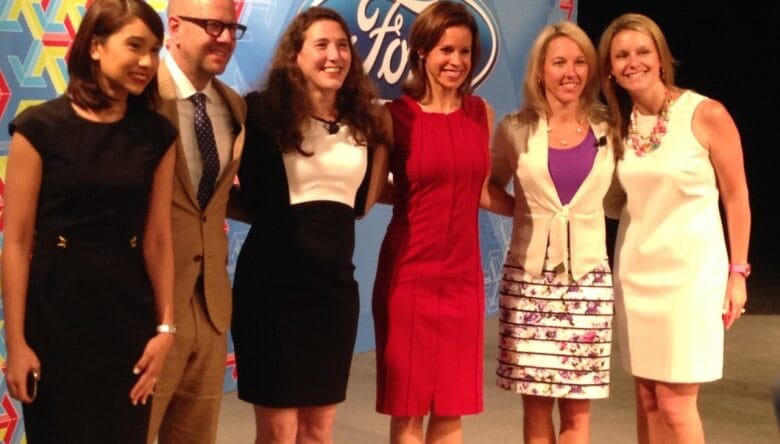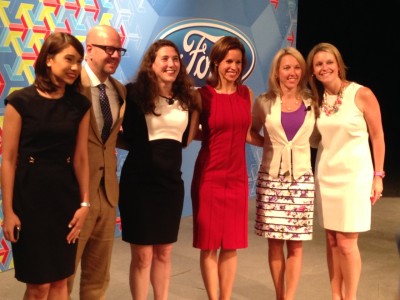The Rise of Women (And More) From Ford’s Future-Focused Think Tank

How Women ‘Thinking’ Will Impact Major Global Trends, from the Ford Future Conference

Further With Ford: A conference on the future revealed how women are impacting what’s ahead. Among the thought leaders (left to right) Anika Wycoco, Ford Consumer Communications, John Gerzema, author of The Athena Doctrine, Jennifer Senior, author of All Joy and No Fun, Jenna Wolfe, Today Show anchor, Chantel Lenard, Director, US Marketing, Ford, and Marisa Bradley, Consumer and Broadcast Communications Manager, Ford
If you’re wondering what the future holds—and who doesn’t?—you’re in luck: I recently attended the Further with Ford conference in Dearborn, Michigan, held at Ford’s world headquarters.
This conference isn’t what you’d think a major automaker would serve up to journalists and bloggers (i.e. “Trends in Torque” or “Eye on Ion Batteries”). The Ford meeting was a peek inside the information that their planning teams use to predict what you, the customer, will want and need in your car, from colors and comforts to technology and connectivity.
Spoiler Alert: Women Are Changing The World
The overarching theme of the meeting was the impact women are having on the world: as consumers, as moms, as workers, as leaders, as game players—no matter what we do, we tend to do it with the same values, styles and goals. Even old white guys in the business world are starting to think, ‘hey, there’s something to this, I’d better get on board.”
The Best of Both Worlds: Women Rule, Both At Home and At Work
Women are impacting the world in two major ways: as workers and as consumers, though that’s not the big news.
It’s HOW women work and consume that is changing our world. Three basic concepts—information, collaboration and engagement, as well as all the values that go into those concepts—define how women are having such impact. Here’s a look at women themselves, and then at the data that is starting to form about our needs and habits that came out of the conference:
Still Ruling the Roost
Women are the most powerful market opportunity:
- They represent $20 trillion in consumer spending, control 80% of all household purchases (in China they control 75% of all household purchases).
- Female drivers outnumber males for first time in history.
- 75% of female buyers feel misunderstood by car companies.
- Today’s mothers spend more time with their kids than mothers did in the 1960s (we don’t cook or clean as much, and we think that’s just fine).
- Women have changed the face of parenting, affecting dads, too: fathers spend two to three times as much time with their kids as their dads did.
She’s Leading Workplace Trends, Too
There are 1 billion women in the workforce, and that number will double in 10 years
- 67% of corporate management roles are held by women.
- Leadership traits that are considered “feminine” are most valued traits.
- The ‘knowledge economy’ fits women’s natural skill sets, including being organized, collaborative, expressive and flexible.
- Two thirds of Athena Doctrine survey respondents think the world would be a better place if men thought like women.
- While men from the Baby Boomer generation may have resisted women as leaders, younger millennial men don’t.
- 57% of Athena Doctrine survey respondents were “dissatisfied with the conduct of men in my country” and the number was higher among millennials (59%).
- 81 percent of workers are not engaged or connected to their work; they don’t feel like they are collaborating or connecting.
- This costs companies 3.1 trillion a year because people not inspired at work.
She Says, He Says: How She Shops Differently From Him
When it comes to cars, women and men have the same conversation, but the dialogue is different.
Women: I want a car that’s safe in an accident.
Men: I want to avoid having an accident.
Women: I want a car that’s reliable.
Men: I want to stay out of the repair shop.
Women: I want a car that can pass a truck on the highway.
Men: I want a car that is fast.
Women talk about cars in the context of how it solves an issue or enhances life.
Men talk about a car’s statistics and how they compare to other cars.
Women learn about cars from friends, family and people whose opinions they respect.
Men will seek out the expert opinions.
What This Means: Data (About All of Us) Is The New Currency
They say the real product of our new digital age is us: all these devices, systems and apps we use are revealing marketable information about us. But it’s not all invasive; the corporate world is learning how to be smarter, faster, better at what they do. So, what are they learning? Here are some major corporate trends and observations:
- Corporate learning the old way: Hire experts to provide questions and answers.
- Corporate learning the new way: experts provide questions, data provides answers.
- Mobile payments and systems are future and your phone is your key: with your phone you’ll be able to lock your own door, get on a plane, fly to another city, walk into a hotel, check in, go right to your room and unlock your hotel room door.
- Air travel can predict consumer spending: when airline sales are up, people spend twice as much to travel as when they drive, lodging and related areas will see a spike in sales. Marketers can also see where people are going and anticipate what they will spend.
- People are moving back into cities, living in smaller spaces and needing less ‘stuff.’ That means they will need less furniture, appliances and belongings (and more services and conveniences)
- When people have discretionary income, how do they spend it? On things that have a ‘forever feel:’ Jewelry sales spike when gas prices drop because it’s an investment, feels permanent, it’s something that can be given to our kids.
- ‘Swapability’ will be key; people will want to replace the battery, not the phone; to ‘print’ a replacement part (For a toaster? For a phone? For a remote control?) on a 3D printer.
Our Data, Ourselves
- Wearable tech will become common place: designs like Fitbit and designers like Tory Burch are starting to make the move into making tech even more fashionable.
- Tech will have a nuanced presence so it can mingle with other devices such as jewelry.
- Color is emotive and will be an important part of our wearable tech.
- We will need to have wise devices, not smart devices; devices that filter the clutter will win the consumers heart.
Going Digital Native: Our On-Screen Life
We are in an Engagement Era; people are more productive and happier when they are engaged in what they are doing.
- The opposite of play isn’t work, it’s depression.
- Gamers become obsessed with games because they are engaged, which links back to the workplace trend: people become disillusioned with work because they are not engaged.
- People spend 300 million minutes a day on angry birds (that’s 400K years!).
- Gamers are at ‘maximum engagement’ level for 7 billion hours a week.
- 99% of boys under 18 play 1 + hours a day, 94% of girls.
- 92 % of two-year-olds play digital games.
- 3 out of 4 games are collaborative or cooperative.
- Call of Duty players spend 170 hours on the game, when a new game comes out, 1 in 4 players call in sick to work that day so they can play.
- 50 million people subscribe to video services; TV is in the process of being vaporized.
- Software is the new packaged good: As things become informational, they loose physical characteristics. The challenge to business is to turn goods into software.
- Cloud computing will only speed this transition; start ups are not obligated to invest in hardware, software or systems.
If this all seems too overwhelming, one last finding was reassuring: tech and the future will move at the speed of people: Tech advances at the rate that people can teach each other. There’s that collaboration and engagement thing, again. For me, I’m off to share this with my two daughters. The future is bright for them, and knowing this helps me to plan for their possibilities.
The Think Tank in Attendance
What a fun and inspiring couple of days; it was sort of like sitting down with Ford’s very own think tank, a bevy of thought leaders. Facts and figures quoted here came from:
Sheryl Connelly, Global Trends and Futuring, Ford Motor Company
Chantel Lenard, Director, US Marketing, Ford:
Jennifer senior, author of All Joy and No Fun: The Paradox of Modern Parenthood, and senior editor at New York Magazine
John Gerzema, author, The Athena Doctrine: How Women (and the Men who Think Like Them) Will Rule the Future
Chuck Holland, Vice president, Industrial Engineering, UPS
Cynthia Czabala, Vice president, Data Services, InterContinental Hotels
Gadi Amit, founder, New Deal Design
Robert Tercek, TV industry exec, innovator and Oprah’s go-to guy for digital strategy
Jane McGonigal, game designer and author of Reality is Broken: Why Games Make Us Better and How They Can Change the World
Sarah Quinlan, Senior vice president, Market Insights, MasterCard
Disclosure: I was Ford’s guest for this conference but was not compensated in any way for my attendance. The delight in attending and learning was all mine.
